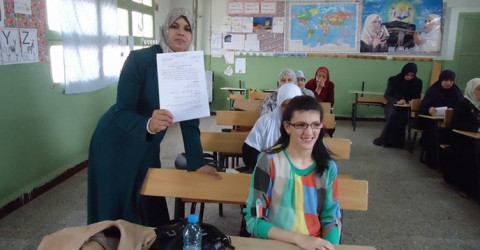
GCED Basic Search Form
Quick Search
You are here
News

The National Office of Literacy and Education for Adults (ONAEA) of the Algerian Ministry of Education is awarded the 2019 UNESCO King Sejong Literacy Prize for its programme ‘Multilingual National Strategy for Literacy’.
The ONAEA launched this multilingual programme in 2016 in support of the implementation of the 2008 National Strategy for Literacy, following the adoption of Tamazight as the official national language in addition to Arabic.
The strategy includes an 18-month literacy course for adults in both of the official languages, emphasizing the importance of starting to learn in a mother language to acquire further languages and become a lifelong learner.
Kamel Kherbouche, Director-General of ONAEA describes the programme as a “logical outcome of a long process, combining literacy and linguistic policies in the country”.
Tamazight speakers now have access to literacy programmes in their mother tongue, which facilitates their access to the Arabic language, while Arabic speakers have the possibility to learn Tamazight. Through a bilingual literacy programme, the government aims to improve the relevance of education in Algeria as a multilingual society and expand the reach of its literacy efforts beyond Arabic speakers.
In addition to the multilingual aspect of the programme, which also reaches certain nomadic populations, the national literacy strategy has a general resonance among rural populations as well as women, who make about 90% of the participants.
Thinking beyond acquiring literacy skills
The programme was designed to take into consideration leaners’ profile and their immediate environments. A learner who successfully passes a final exam at the end of the course can pursue further learning through distance education, vocational training at a specialized institution and income-generating activities.
Talking about the “post-literacy opportunities” offered to participants, K. Kherbouche explains two options available: to pursue a university level education or to follow a professional training course in order to enter the labor market. He invites everyone to believe in the transformative power of education.
Building on these achievements, and with the exposure provided by the 2019 International Literacy Prizes, ONAEA aims to reinforce its partnerships with both public institutions and civil society to encourage more people to take part in literacy programmes.
“The access to learning literacy in their mother-tongue will help people to move beyond any stigma or fear of failure,” says K. Kherbouche, looking ahead to a positive future of the National Office’s programme and its slogan “Literacy is a shared responsibility”.
This year’s UNESCO International Literacy Prizes will be awarded to laureates from Algeria, Colombia, Indonesia, Italy and Senegal on the occasion of International Literacy Day. The Prize Award Ceremony will take place during the global event for International Literacy Day on 9 September at UNESCO Headquarters. This year’s International Literacy Prizes and global event are organized around the theme of ‘literacy and multilingualism’.
URL:
https://en.unesco.org/news/algerias-multilingual-national-literacy-strategy-wins-unesco-prize
